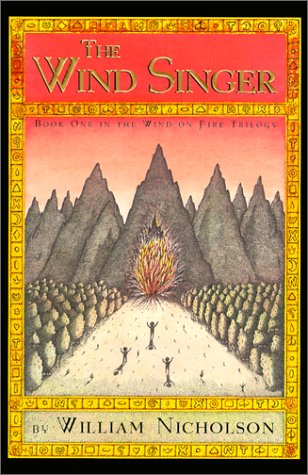Reviewed by funstm on
The story follows the Hath family, an orange ranked family in the city state of Aramanth. The Hath family are smart but they're not much good at tests meaning their family ranking is and remains low. When Kestrel and her twin brother Bowman forget their homework they have to move towards the back of the classroom but Kestrel is resentful of the punishment and decides to move all the way to the back of the class where a boy named Mumpo sits in rebellion. The teacher is furious at her dissent. Mumpo is excited that he might have a friend and he tries to hug Kestrel but she's disgusted by his running nose and terrible odour. The teacher sees this and takes it as a win, making sure to mock Kestrel and her new friend Mumpo for the rest of class. At lunch, Kestrel decides to ditch and Bowman and Mumpo both follow her.
She ends up climbing the Wind Singer - a mysterious tower that was built many years ago and is said to sing but has been silenced for many years. Kestrel climbs to the top and insults and mocks the entirety of Aramanth, the people, the structure and the mindlessness in the loudest voice she can. Her punishment sees not just her, but the entire family punished for their disobedience. But in the midst the family finds that there may be more sinister behind the sameness of Aramanth - that great evil runs afoot. And so starts Kestrel's journey to find the key of the Wind Singer and restore uniqueness to her people.
I liked Kestrel for the most part. She can be a bit whiny but she's brave and daring and set on marching to the beat of her own drum. Bowman was the perfect foil to her brashness, full of kindness and heart and compassion. I liked Bowman as well - I liked the loyalty he had to Kess. Mumpo was sad. I felt really sorry for him and the life he leads. I liked the bravery he portrayed and the loyalty he had when it came to his friends and I liked that Kess and Bowman may not have been overly nice to him but they did return his loyalty, doing their best to keep him safe.
Ira Hath (the mum) amused me with her prophetess routine. And I liked the gentleness and caring Hanno (the father) has for his family. The plot was a bit slow at times. Although I did enjoy the craziness of Ombaraka and Omchaka and the logic they used convinced if you weren't one, you had to be the other.
There are still quite a few questions left unanswered but it is the first book in a trilogy. I vaguely remember them being answered when I first read the series. Overall it was an average fantasy read. It will likely appeal more to fans of dystopian societies than true fantasy readers. If you liked The Giver by Lois Lowry this will probably be a real win for you. 3 stars.
Reading updates
- Started reading
- 27 February, 2021: Finished reading
- 27 February, 2021: Reviewed
- Started reading
- Finished reading
- 27 February, 2021: Reviewed
- Started reading
- Finished reading
- 27 February, 2021: Reviewed
